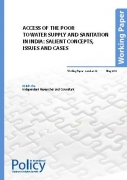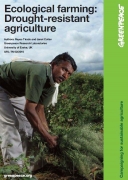India
Access of the poor to water supply and sanitation in India - Salient concepts, issues and cases by the International Policy Centre for Inclusive Growth
Posted on 20 Dec, 2010 10:04 PM This paper by the International Policy Centre for Inclusive Growth deals with access of the poor to water supply and sanitation in India. It argues that economic, technical, institutional as well as social factors constrain access to safe drinking water and proper sanitation in India for both the urban and rural poor, and that coverage figures do not reflect this restricted access. It finds that, increasingly, communities are being required to manage their own water and sanitation schemes, not just in rural areas but in urban ones as well.
This paper by the International Policy Centre for Inclusive Growth deals with access of the poor to water supply and sanitation in India. It argues that economic, technical, institutional as well as social factors constrain access to safe drinking water and proper sanitation in India for both the urban and rural poor, and that coverage figures do not reflect this restricted access. It finds that, increasingly, communities are being required to manage their own water and sanitation schemes, not just in rural areas but in urban ones as well.
The paper deals with domestic water supply and sanitation and presents a historical overview of the phenomenon in rural and urban India. This is followed by a critique of available figures for coverage which, it is contended, seem exaggerated because they do not account for the several constraints to access. It addresses the specific institutional problems faced in the public sector delivery of these two utilities in India apart from dealing with the parallel yet thus far limited presence of the private sector in these twin arenas.
Ecological farming: Drought resistant agriculture – A paper by Greenpeace
Posted on 20 Dec, 2010 08:09 PM This paper by Greenpeace on ecological farming illustrates proven, modern farming approaches that help cope with drought. It elaborates on the drought-resistant crop varieties and calls for policy makers to increase funds for research on the system.
This paper by Greenpeace on ecological farming illustrates proven, modern farming approaches that help cope with drought. It elaborates on the drought-resistant crop varieties and calls for policy makers to increase funds for research on the system.
Human-induced climate change is resulting in less and more erratic rainfall, especially in regions where food security is very low. The poor in rural and dry areas will suffer the most and will require cheap and accessible strategies to adapt to erratic weather. This adaptation will need to take into account not only less water and droughts, but also the increased chance of extreme events like floods.
Biodiversity and a healthy soil are central to ecological approaches to making farming more drought-resistant and more resilient to extreme events. Practices that make soils better able to hold soil moisture and reduce erosion and that increase biodiversity in the system help in making farm production and income more resilient and stable.
2011 India Development Marketplace Competition
Posted on 20 Dec, 2010 05:02 PMContent and Image Courtesy: Development Marketplace (DM)
The Development Marketplace (DM) is a competitive grant program that identifies and funds innovative social enterprises working on projects with high potential for development impact.
State Bank of India (SBI) Youth for India Fellowships Programme 2011
Posted on 20 Dec, 2010 04:26 PMContent and Image Courtesy: Youth for India

SBI Youth for India is a fellowship programme initiated, funded and managed by the State Bank of India in partnership with reputed NGOs. It provides a framework for India's best young minds to join hands with rural communities, empathise with their struggles and connect with their aspirations. The programme seeks to help India secure an equitable and sustainable growth path by:
- Providing educated Indian youth with an opportunity to touch lives and create positive change at the grass root level in rural India
- Providing NGOs working on development projects in rural India with educated manpower whose skill sets can be used to catalyze rural development
- Promoting a forum for the programme alumni to share ideas and contribute to rural development throughout their professional life
Can India be firm with China on Brahmaputra dams ? - An article by Himanshu Thakkar
Posted on 20 Dec, 2010 02:34 PMForwarded to the Portal by: Himanshu Thakkar
Article and Image Courtesy: SANDRP
Author: Himanshu Thakkar
Chinese Premier Wen Jiabao’s forthcoming India visit (15-17 Dec 2010) provides another useful opportunity for India to be firm and forthright with China on India’s concerns about Chinese dam and hydropower projects on the shared rivers, including in the Brahmaputra basin. The importance of this issue cannot be underscored considering that this issue has been raised in the Parliament several times, even the Prime Minister has had to make clarifications in the recent past, the people and governments of several states, including Assam and Arunachal Pradesh have been agitated about this. India’s Planning Commission, Environment, Water Resources and Power Ministries have also been raising these concerns.
ACWADAM’s certificate course on training and facilitation in hydrogeology to enhance civil society capabilities in watershed and groundwater management
Posted on 20 Dec, 2010 12:29 PM Organizer: Advanced Center
Organizer: Advanced Center
Understanding groundwater - A course by ACWADAM
Posted on 20 Dec, 2010 01:01 AMThe Advanced Centre for Water Resources Development and Management (ACWADAM) has created a power-point course to explain the formation of groundwater and its management.
The course consists of 6 modules; it includes the basics of understanding groundwater, study of geology, groundwater level and movement, planning and management of groundwater, storage and flow of groundwater and water quality. The modules have been made into succinct power-point presentations that include charts, diagrams and photographs besides the written word.
Review of current practices in determining user charges & incorporation of economic principles of pricing of urban water supply
Posted on 19 Dec, 2010 07:21 PMThis paper is an outcome of The Energy Research Institute's (TERI’s) study for the Ministry of Urban Development (MoUD) under the Ministry’s Centre of Excellence (COE) to “Review the existing guidelines of determination of user charges for water and sanitation services and to incorporate economic principles of pricing in urban water supply sector in India”.
Transdisciplinary method for water pollution and human health research – A working paper by Peter Mollinga
Posted on 19 Dec, 2010 06:21 PMThis paper discusses how to go about designing an interdisciplinary or transdisciplinary research project or programme, with ZEF’s research initiative on ‘water pollution and human health’ in India as the background of the presentation. A summary is given of Pohl and Hirsch Hadorn’s main arguments regarding ‘design principles’ for inter- and transdisciplinary research, and the basic tools they have developed for this are discussed in the context of ZEF’s ‘water pollution and human health’ research initiative.
International Rivers is looking for Executive Director
Posted on 18 Dec, 2010 12:17 PMContent and Image Courtesy: International Rivers
International Rivers is accepting applications for the position of Executive Director. International Rivers seeks a proven, passionate, and dynamic Executive Director who has a keen sense of the urgency of the threats to rivers and communities – as well as the need for sustainable solutions – and is ready to take on this challenge with enthusiasm, strategic vision, creativity, and bold tactics.